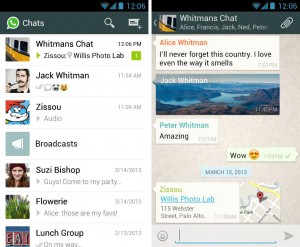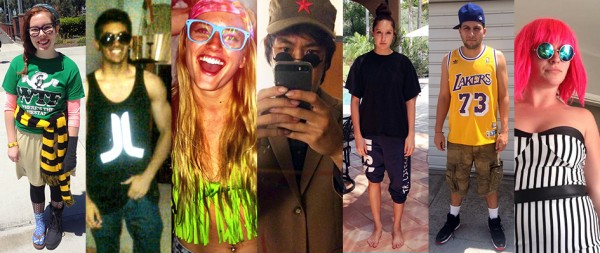WhatsApp!
 This surprised me. I thought video chat would be more engaging and fun. And I know how hugely successful Google Video Hangouts are in the professional world. I think what I may have failed to realize is that a Video Chat is a lot like a Voice Call, and student-aged peeps have, I think, overwhelmingly chosen text apps like WhatsApp over voice. Just as email used to be “what you use to talk to old people,” a role that Facebook seems to have now, I think voice might be what you use to talk to parents, but WhatsApp is probably a more fun way to engage with friends.
This surprised me. I thought video chat would be more engaging and fun. And I know how hugely successful Google Video Hangouts are in the professional world. I think what I may have failed to realize is that a Video Chat is a lot like a Voice Call, and student-aged peeps have, I think, overwhelmingly chosen text apps like WhatsApp over voice. Just as email used to be “what you use to talk to old people,” a role that Facebook seems to have now, I think voice might be what you use to talk to parents, but WhatsApp is probably a more fun way to engage with friends.
SIDENOTE:
It’s interesting that the already aging Facebook is trying to stay relevant by buying both Instagram and WhatsApp and trying to buy Snapchat. (Facebook bought Instagram in Apr ’12 for US$1B, WhatsApp in Feb ’14 for US$19B, and unsuccessfully offered US$3B for Snapchat in Nov ’13)

Read
Whenever you visit a library you see one of those well-intentioned Read posters featuring some cool celebrity. I do think reading is important and valuable and the decline of reading probably isn’t good. But it’s also important to remember that back in the days of yore, reading didn’t have a lot of competition. Today reading not only has competition from films and myriad other media forms, but it also has competition from, well, reading! When you see a poster in a library that says “Read” it might be suggesting to read a book. But if you count all the messaging, blogs, and other online media that peeps read, that probably adds up to plenty of novels worth of pages in a year. We can debate whether the nature of short chunks of reading offers the same intellectual and analytic value that diving into the mind of a novel does.
Maybe a novel is a much richer experience for a human being.
Or maybe the interactivity and discussion of text, chat, blogs, and other media offers a rich space of community, interaction, and a place to test perceptions and ideas.
Infinite Choice
 We probably should read more novels. It is an extraordinary form that at its best offers unique and powerful insights. But we should also appreciate that reading has a lot of competition today. Similarly, in the past, and in rural places, things could get boring. But in a place like Los Angeles in the 21st-media-century, boredom almost isn’t an option. One student commented that Foucault wouldn’t get tenure today! And I wonder how many students are ready or interested in embracing the subtlety of a John Cage or Allan Kaprow perspective when they have so many options and so much stimulation available in IRL Los Angeles plus the infinite vastness of YouTube and all the other online spaces.
We probably should read more novels. It is an extraordinary form that at its best offers unique and powerful insights. But we should also appreciate that reading has a lot of competition today. Similarly, in the past, and in rural places, things could get boring. But in a place like Los Angeles in the 21st-media-century, boredom almost isn’t an option. One student commented that Foucault wouldn’t get tenure today! And I wonder how many students are ready or interested in embracing the subtlety of a John Cage or Allan Kaprow perspective when they have so many options and so much stimulation available in IRL Los Angeles plus the infinite vastness of YouTube and all the other online spaces.
Today’s academic model is about 200 years old. Affluent kids moved from boarding school to university. There wasn’t much else to do besides studying and pranks. I think college is still a place where new ideas and great friendship are formed. Does a class need to be part of that? Maybe. But the sorority, the anime club, the volleyball team, the debate team, and so many other options on and off campus also enrich the student experience.
Flexibility
Also dragging the discussions down is the idea that an online class is supposed to be at the learner’s convenience. So text chat: maybe. Video chat: way too much scheduling hassle.
Conclusions
Weekly video chat is out. There could be a possibility of having a week or 2 of special meetups so students could actually meet each other. Text chat is a possiblilty. But as one student noted, since they’re doing weekly creative activities and blogging the results, why not have them look at and comment on each other’s work.
I think that’s the best answer for next summer. Instead of discussion groups move to commenting on each other’s blogs. In the academic year F2F class with 150 students it’s easy to be lost. But in a summer class with 25, commenting on each other’s blog posts could be a way to develop better insight into what others are thinking and doing. And it preserves the asynchronous nature of online classes & text chat that students value.
]]>Good Job!
Four years. You’re probably afraid to even count how many thousands of hours and thousands of dollars. You’ve done the work. You’ve learned. You’ve achieved. You’ve shown your work. Finally the day comes: you put on a robe, sit in the campus mall with your classmates, and listen to speeches as thousands of family and friends look on. And then it happens: your name is called, you walk onto the stage, the president shakes your hand…
Sort of…
Unfortunately as you walk off the stage we Google your name and discover that you don’t have half the “Internet Resume” as some guy who never even went to college.
After all that work, Did you forget to tell The Internet?
There’s a world of curators, collectors, and ordinary citizens who might be interested in your work. Don’t keep it a secret.
SEO Artists’ Portfolios
In this workshop we’ll look at the current search results for your name, your online presence, start or develop your website, and work toward a richer, higher ranking set of search results for your name.
Free Workshop
Leader: Glenn Zucman
Time: 10a – 1p Friday May 3
Place: FA4-108A, School of Art, CSULB
Bring: Your Laptop & power cord
• More Info: mixedreality.me/tag/artists-portfolio
• Free Registration: Eventbrite
People come to The University for many reasons: for some it’s a quest for knowledge, for others it’s just the thing you do after high school, and for many, it’s 4 or so years to prepare for a hopefully satisfying and fulfilling career. In those 4 years you’ll take about 40 classes. Some will be life changing. Some, not so much. But hopefully in all of them you’ll do good work and learn something. Just as a “bad film” can still have that one memorable supporting actor who really affected you, so even in a not-so-memorable class, you might write one really great paper.
As artists, whether we make objects like paintings and sculptures, or ephemeral works like performance and installation that we document through photo/video/text, we might be more likely than many students to preserve and document our work. But where can it be seen? In a gallery for a few weeks every year or so? And what do we do with that memorable paper, throw it away after we see the grade?
Every May thousands of students graduate from CSULB. Their name is called, they walk onto a stage in the middle of the mall, and President Alexander shakes their hand. But what happens after President Alexander shakes your hand? If I was sitting on the steps where you exit the stage with my laptop, and Googled your name 5 seconds after President Alexander shakes your hand, what would come up in the search results? A long, impressive “Search Result Resume” that shows me, and anyone else who wants to know, just how busy you’ve been for the last 4 years and how much you’ve accomplished?
Or almost nothing?
Many of you care a lot about what your friends post on Facebook, and you might ask them to take down a photo or video if you think it makes you look bad. Shouldn’t you care at least as much about your online “resume” as you do about your online “yearbook?”
I believe a great 4-year degree should include 3 things:
1. A head full of knowledge & ability
2. A handshake from The President & a piece of paper (“diploma”)
3. An awesome “resume” when I search on your name
If you don’t have #3, how are #1 & #2 going to help you start building your career? I believe if you get that handshake and piece of paper, without also having #3, then in represents a failure by the university, a failure by the faculty, and a failure by you. Since I don’t like failure, let’s get started on building great search results for you…
Search Engine Results
We know in 2013 when you want to show your art in a gallery, when you apply for a job, when you run for office in student government, when you want to join a club or go on a date, someone is going to “Google you.” Since we know this is going to happen, we should know what they’re going to find, and we should work to make sure they find a bounty of compelling work there.
We sometimes think it’s vain to “Google yourself,” but it’s not. Is it vain to brush your teeth? Is it vain to look look in the mirror before you leave your house for the office? Is it vain to read your resume before you hand it to someone? It’s your responsibility to know what people will find when they look for your name on search engines like Yahoo, Bing, and Google.
When you do search your name, don’t worry too much about how many results it claims to find, 1,000 or 1,000,000 or whatever. If your first name is “Paris” or your last name is “Hilton” or anything like that, the number of results could be very different. And most peeps never look past Page One of the results anyway, so it’s not so important that there’s 80,000 results for your name, what is important is that the stuff on page 1 is actually about you and that it’s strong work.
If Page One mostly isn’t about you, there are a few possible reasons:
1. There’s almost nothing about you online.
2. You have a more common or popular name like “Paris Hilton” and that other person is taking up all the space.
3. There is content about you online, but it’s not tagged well or is somehow hard to find.
Privacy?
There are many different players in our 21st century media culture, and for different reasons, many of them would love for you to be invisible online. Your parents or grandparents might fear The Internet because they don’t really understand it, and they’d like you to be invisible because they think you’ll be safer that way. Old media would love for you to be invisible because they don’t believe in a 21st century many-to-many Internet, they liked the old 20th century one-to-many model where they chose what music, games, movies, and books were published and you just paid your money and consumed their product.
I certainly don’t believe that everything in your life must be public. It’s your right to have all the privacy you want. But I do believe that most people are better served by being more public. And I certainly do believe that if you’re an artist, or business marketer, or nurse, or marine biologist, or any of the other 65 majors that I regularly come in contact with at CSULB, that you are better served by showing the strong work you’ve been doing to an online audience.
So if you do have a “Paris Hilton” name, it’s not “yay, I can hide,” it’s “grrr, they’re standing in my frame!” If too many others are “polluting” your search results, you might think about using a middle name or a nickname on all your online projects. You should think about some way that feels comfortable and right for you, to have a distinct online presence.
SEO Artists’ Portfolios
I actually mean a few different things by the term “SEO Artists’ Portfolios.” I mean a specific website that you control. I also mean all the search results that Bing, Yahoo, or Google produce for your name, which you do not control, but which you can influence. You might also think about how you fare when someone searches not for your name, but a topic, like “Contemporary Painter Los Angeles” or “Accountant CSULB” or “Documentary Cinematographer.” Being on Page One of a search like that could be really challenging, but what a great resource if you could get there!
Isn’t LinkedIn Enough?
You might know that as Facebook is the network “for friends,” that LinkedIn is the network “for professional contacts.” So, isn’t being on LinkedIn enough? Or Behance? Or Deviant Art? Some would say yes. I say no. For sure you should spend some time developing a strong profile on LinkedIn and other professional sites in your field, like Behance. But all of these sites, and Facebook, Instagram, Pinterest, and on and on, they’re all somebody else’s property.
If you were driving around LA or Long Beach and saw a lot with nothing on it, would you bring a truck full of lumber and start building a house there? It might be a nice house you built, but what do you tell your kids when they wake up one morning and someone’s deleted your house? If you read your Terms Of Service – you know that thing that nobody reads but that you hear is creepy because this or that website wants to steal ownership of all of your stuff? Yeah, forget that red herring, what actually should disturb you in the TOS is that they reserve the right to cancel your account at any time for no reason, and they also reserve the right to axe the whole service at anytime with no notice.
Platforms like Facebook, Pinterest, Instagram and others are the New Town Square and it’s essential for you to develop a strong presence there. But I believe you should also have a little piece of land that is your own. Buying the domain name “me.com” isn’t vain at all, and it’s way more useful than buying a personalized license plate for your car. If you’re the tech type, you can build your own site. You could use HTML/CSS, or let a program like Dreamweaver do it for you, or you could assemble it with powerful tools like Drupal or Joomla. But for most mere mortals I think the best website is a Blog or a Wiki.
In many ways I like the organizational structure of a wiki better for a thing like a portfolio, and there are zillions of great wikis out there, besides just the one ultra-famous wiki that everybody uses every day. Still, in my experience, blogs seem to develop more exposure and connection potential beyond the core community of users. And these days blogs are really Content Management Systems (CMS). You can use “a blog” “to blog” if you want to, but you don’t have to, it can simply be your portfolio site.
And while you don’t have to blog, I’d really encourage you to. You don’t have to write The Great American Novel, in fact you shouldn’t, a blog post can be a short, quick, and easy piece. Just a quick thought. Yes it could also be more substantive. I think if you do post, that you’ll find over time you might develop a following, and whether you do or not, you will develop your own thinking about your field and your work, and you’ll find yourself much better able to articulate your ideas when you chat with friends and colleagues, apply for a job, or want to communicate in any other way.
Platforms
Probably the 3 most popular platforms today are WordPress, Blogger, and Tumblr. Students tend to be most familiar with Tumblr, Blogger less so, and WordPress probably not at all. They’re all great platforms to present your work. Personally, I find WordPress to be the strongest. WordPress comes in 2 flavors, the free, hosted, “WordPress.COM” and the self-hosted “WordPress.ORG”. For many peeps the advanced options of the self hosted .org option are the best. But if you’re just getting started, the no or very low cost of .com (it’s free forever, but you might want to pay $20 or so /year for an optional “me.com” domain name) and the simplicity of it are probably the best start. And if you ever want more flexibility you can always move your WordPress.com blog to a self-hosted site.
Analytics
There are many ways to track visits to your site. Hosted sites like Wikispaces or WordPress.com offer their own “analytics,” and on other sites like WordPress.org or Tumblr you can run Google Analytics or other analytics tools. Don’t get depressed if you don’t get many visits. Although if you do use the New Town Square of Twitter, Facebook, LinkedIn, etc, to let your contacts know when you’ve posted new work, you will start to get some “Studio Visits” from those peeps in the “Town Square.”
Sometimes you don’t need a lot of traffic to your site. Maybe you just want that one museum curator or human resources person to see it and be impressed. So sometimes the traffic of One Visit, can make all the difference. Other times you might want a less specific, but larger general audience to be able to know about your work. Whatever your interests, Tracking analytics can let you know how your online presence evolves over time. Just as “Googling yourself” is a good thing, not a bad thing, so tracking your visitors doesn’t have to be vanity, but simply being informed and aware.
Next Steps
And then you design that website! The site for a photographer probably wants to look pretty different from the site for a journalist, but whatever you do, your site should make a compelling presentation of your work, your professionalism, and your sensibility. The vibes from a Graffiti Writer’s website and a Biologist’s website might be pretty different, but both want a site that says, “I’m the real thing.”
haha, 2,000 words and I haven’t talked about Search Engine Optimization (SEO) yet! I guess Design and SEO will have to wait for future posts, but if you think about the ideas in this post, you’ll already be creating a site that’s pretty SEO friendly!
Links
Even though I’m saving the “SEO Stuff” for “next time,” I have to give you one huge tip before we leave for now: Search Engines LOVE Links! Links are a Search Engine’s life blood. They love it when you link to other sites, and they really love it when other sites link to you. With over 35 million Twitter followers Lady Gaga was the world’s #1 Twitter user. Right up until Mr. Bieber reached 37 million. (Katy Perry is #3, Barack Obama is #4, and the other Justin is #10) If either of the Justins put a link from their website to yours… Google would be impressed!
kk, neither Lady Gaga, Katy Perry, nor The President are likely to ever link to you. But if you “trade links” with all your peers here at The Beach, you’ll be both improving your search rankings, and building an informal community of people you respect.
Post… link… repeat!
R E S O U R C E S
• wordpress.com
• WordPress Hosting: BlueHost – pretty good hosting for ridiculously low prices
• WordPress Hosting: WP Engine – $29/month or $290/year is a lot for most college students, but their servers are fast & secure and $300 really isn’t a lot if you care about your portfolio
• Blogger
• Tumblr
• Wikispaces
• Wikis by WetPaint
• PB Works (formerly PB Wiki)
• MediaWiki
I M A G E . C R E D I T S
• Redefine Online Magazine
• Fancy Pants Design Ltd.
• Cargo Collective
• Theme Squirrel
• 101 Best Websites
• Main Layout
